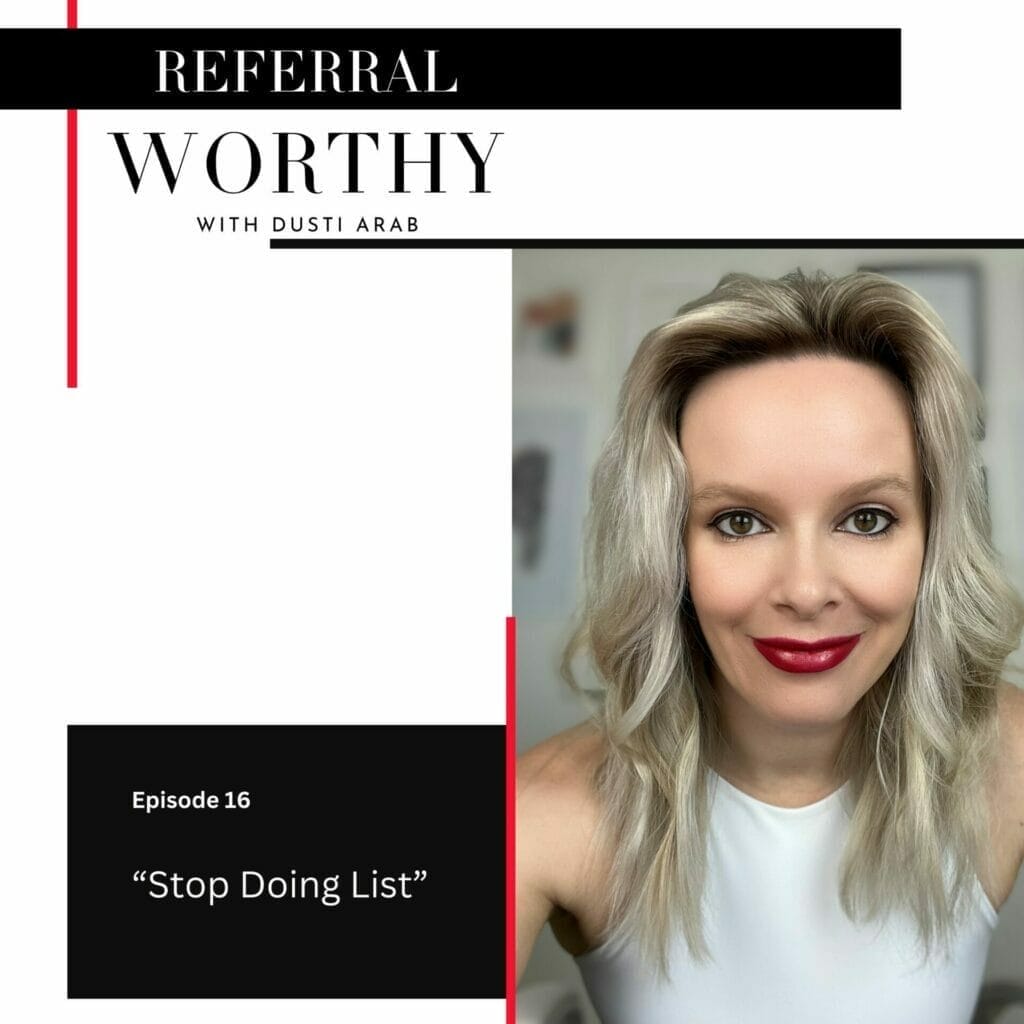
Listen above or subscribe on Apple Podcast + Spotify
This week, Dusti shares an indispensable tool she employs at the outset with every business owner, emphasizing its crucial role in clearing the decks for effective marketing and operational strategies. She introduces the concept of a “Stop Doing List.” This tool isn’t just about identifying tasks to eliminate; it’s about fundamentally reassessing where your energy goes and making strategic decisions that align more closely with your goals and personal well-being.
Dusti elaborates on refining the Stop Doing List and helping business owners focus on what truly matters by removing or reallocating the energy drainers that hinder productivity and satisfaction. Throughout the episode, Dusti doesn’t just explain the process; she provides a hands-on walkthrough. This episode is a must-listen for entrepreneurs and business leaders looking to streamline their responsibilities and reclaim their passion for their work.
Referral Worthy is hosted by Dusti Arab, Fractional CMO and marketing strategist. She's the founder of the reinvention co, a marketing consultancy for personality-driven companies with big online presences and small teams. Learn more at www.thereinvention.co.
Love this week's episode of Referral Worthy? Leave a review + subscribe!
Referral Worthy intro, outro and transition music is named We are invincible by Tim Hirst and was found on Epidemic Sounds.
“Before you can really spend good, dedicated time on your marketing, you have to clear some space first.”
– Dusti Arab, on why you need a Stop Doing List
Dusti Arab
Hello, and welcome back to Referral Worthy. Today, I’ve got something special for you. It’s just you and me today on this one. So today I am going to be sharing one of my absolute favorite tools with you. And it’s so important to me, it’s actually the tool that I start with first with every single business owner that I work with no matter what level they’re at, because we all need to start at the same place here.
And that is, if you’re going to be trying to invest more time, potentially money into your marketing efforts, you have to clear the decks first. It’s a non-negotiable, because I already know what your schedule looks like, all right. I already know you probably have too many meetings, you are probably overwhelmed. Especially if you are at a certain price point with your services, you are probably not charging enough. And so everything feels a little like, ugh, right? And so we want to remove that feeling as much as we can.
And so the way that we’re going to do that is with a Stop Doing List. Okay? Now, a Stop Doing List is a phenomenal tool for when you’re getting started here. Because even if you’re using it in your personal life, I guarantee there are some things that have probably just piled up that maybe you don’t need to be doing anymore, right?
Now, because I love to make sure I’m giving credit where credit is due Jim Collins of Good to Great, a business classic. If you haven’t read it, I’d highly recommend it. He is the one who had initially put this concept together. And I loved the idea as soon as I started it. And because I mean, how easy is that? Right? I’m just going to write down a total list of all the things that I don’t want to do anymore. And we love that, right? You know, we all want to get things off our plate, we’d love to delegate, whatever. These are all the sexy things we hear as business owners, right?
But then comes the next step. Like yes, I do not want to be doing those things. But if I do not do them, who is? Or does it matter, can that thing just disappear? And so I kind of upgraded the Stop Doing List. And I added a few additional levels to it. Because it’s one thing to know what you don’t want to be doing, which is a great place to start, especially if you don’t know what you want. But, you know, we do what we can here, we start with “I don’t want” because things start to get easier from there.
So I am going to share my screen with you so that you can see exactly what I’m talking about. So this will probably be offered on YouTube as well as my website. But if you are listening to audio only right now, you are going to want to go to the show notes here and make sure you get a copy of this, it’s free, it’s on my website, it’s very easy to find.
Okay, so this is my version of the Stop Doing List. So this is a great place to start if you’re feeling overwhelmed. So the first step is very, very easy for most people. I want you to list everything that is frustrating, irritating, bothering you. Anything you don’t want to be personally spending your time on anymore. Okay. So this is number one, this is the first step.
And after you’ve got your list here, I want you to look through everything and see, what are the top three energy drainers on this list? Okay, now I want you to circle them. Because where our energy is going matters a lot. And if there are some that are particularly draining, if it’s a particular client engagement, or if it’s a project, if it’s you dropping off your kids in the morning, or wherever those major stress points are for you, we just want to get some awareness on that right now.
Okay. So next step, for each one of those three energy drainers. So we’re just going to focus on those three big ones right now. I want you to answer the question. “Why is this so draining? And what am I making this mean?” And the reason I have you ask those two questions are because, as humans, we tend to get very in our heads, like we live in a culture that really prioritizes hustling and glorifies being busy. And that is not the life I want for you. It is not the life I want for me. And we don’t produce our best work that way either. So it’s really not best for our clients either. So for each one of these things, why is it so draining? And what, if anything, am I making this mean?
It is not a moral failing to not volunteer for something you have historically volunteered for. It is not a moral failing to feel like you need some help. Maybe we need to outsource some things. I am a huge, huge proponent of getting those repeat tasks into somebody else’s hands, who is better at them and who enjoys it more.
Every two weeks, I have this lovely girl come over to my house. And she cleans the floors and the bathrooms. She doesn’t do a whole lot else. But it is three hours that I pay her for twice a month. And I tell you what, every time I get a text from her, I’m just like, “Ah, that’s the thing I don’t have to do anymore.” And I am not convinced there’s a better feeling than that. It’s not expensive. And it’s one of those things that just makes me feel like I’m more on top of things. Like nobody wants gross bathrooms and nobody wants to have to rush to clean them when you’re having people over. And that’s something that I have set as a priority for me this year, I want to be able to have people over to my house whether or not it’s perfect. However, I still would like my bathrooms to not be disgusting. I feel like that’s, that’s fair, that’s fair. I’m not putting too much pressure on myself, I swear to God.
But I want you to go through those, okay, sit with them if you need to. And if it’s not immediately clear, consider journaling about it. Journaling is such a great way to take a look at what’s going on and just kind of suss out, you know, and go like pen to paper, go work on it. All right?
Now, next up, and we’re going to do this for the entire list, not just those three, we’re prioritizing those three things. But anything else that’s on your Stop Doing List can go into one of these three categories. Okay. So we have delegate, delay, and do. And with these three, the idea is to sort them out so you can get the shit done. I’m not usually a huge eat the frog girl, which is also an absolutely disgusting phrase, I understand. But the idea behind eat the frog is to do the thing that you don’t want to do first and for neuro spicy folks, that usually is not the right choice, because it means that you don’t do it at all. This might make it a little easier, though.
So for all of these things in these boxes, can you delegate it? Can you outsource it? Or otherwise, get it off of your plate? How can you simplify it? Are there extra steps that we can take out? Like let’s say for instance, small business owners that you have not emailed your list in six months. And now it’s starting to really weigh on you. You’re like, “Oh, God, I let my list die again. I said I wasn’t going to do this again. What do I do now? Do I have to tell them that I’ve been gone because I’ve been busy?” But now I’ve got you. Now you don’t have to do that. You don’t have to explain where you’ve been, et cetera. You definitely don’t have to be like, “Sorry I peaced out, guys.” Like, please stop sending those emails for the love of God. But what you can do is actually get that thing written.
So why haven’t you written the newsletter? Well, maybe you haven’t written it because you have had a full load of client work. It just wasn’t a priority. You didn’t have to worry about drumming up business. Great. And now you do. So now we need to send an email. That’s okay. Don’t make it mean anything other than what it actually means, which is that now you have a chance to catch up with your list and tell them what’s going on with you and what you have available. It doesn’t need to be anything more than that.
So other things we can be thinking about. Are there additional steps here that don’t need to be? Do you actually need to go through and schedule like 10 posts for Instagram, for instance? Or are you just going to pop on once this week and write a really good post when you’re feeling inspired? And just let it go out into the ether? Okay, can we reduce the scope of any of the things that are on our list that feel pressing that, you know, probably aren’t going to move the needle that much anyway? Can you get some support for it? Is there something where you can hire it out? Or maybe your husband could do it? Maybe your wife could do it, whatever?
Or, do we need to salvage and move on? This one is my favorite, because it’s usually the one that relieves the most stress. And it’s either like an unfinished project that has been sitting out here and you’re like, “Oh, my God, that book has just been sitting on my harddrive for 18 months now and I have not even opened that fucking file up.” I am here to tell you that it’s okay if you never open it again. If it doesn’t still have your attention. Maybe it wasn’t what you thought it was. Or maybe it is, and now you’re ready to return to it. What is a low stakes way that we could do that?
But in case it is a salvage and move on project? In that 10,000 words that you wrote, there’s probably still something pretty good in there, right? There’s probably that little nugget, which was the reason you did it anyway. Can we turn it into a short free ad? Or can we turn it into a $2 book on Amazon? Or can we, you know, figure out a way to either trash it and let it go, and forgive yourself? Or figure out how to repurpose it, you know. You have options available, it doesn’t have to stay the same.
That’s the thing about being business owners, like, we have so much creative control, which can be so, so daunting some days, right? But fundamentally, we have so much creative control, like, we could totally make that call. And that’s awesome. Like, that’s fucking great. That’s why we’re the boss, right? You love being the boss. Remember, enjoy being the boss again, this is a good way to do it.
Okay. Now, another question I want you to ask yourself here is, what happens if you don’t do it? Like, take a look at your tasks here? What happens if you don’t do it? What happens if you don’t do everybody else’s laundry? I’m just saying, at some point, they’ll probably figure it out. Right? What else can you let go of, what is currently on your plate that doesn’t need to be, what is actually a priority for you right now? And what can wait.
So sort everything out. We’ve got delegate, delay, and do on the do list. Generally speaking, I like to keep those as like, I start the list, at least, with like my little itty bitty short things. Like this week, one of my little bitty things was getting all of my husband’s tax documents together. So I needed him to go and do that. But I had to let him know, “Oh, hey, our tax stuff is ready to go. I need to get all this from you.” So even just those little things, where it’s like, “Oh, yeah, I just need to send him an email so he sends me all his stuff.” Great. It’s a good idea to try and get some of those quick little wins, if you can, in case you have some do things on your chart that are a little bit more daunting. But again, break it down into steps. Figure out if you can delegate any of it, all that good shit.
Okay. And last but not least, what’s the next best action to take? I hope that it’s related to one of your three big guys on here, the three things that you’re really struggling with, that are draining your energy. If you can get them done and off your plate, or figure out a way to give yourself some distance there, you are going to be so much happier as a result.
All right, everybody, I hope that this was so useful for you. Okay, before you can really spend good, dedicated time on your marketing, you have to clear some space first. This is a normal thing. It’s a normal place to start. It’s a normal thing to feel like, “Oh my god, what am I doing? How am I possibly going to have time to market my business when I’m inside of other people’s or delivering my service, or whatever?” Every single business owner you know is struggling with this at every level, I promise. If it’s not based on client things, it’s based on internal company things, but it’s still, fundamentally, it’s a people problem. And it is a project management issue. And both of those things are completely solvable. Make sure you’re building a business that you actually want to work in, alright?
Alright. It should be as good for you as it is for your clients, Boo. Thank you so much for listening in today, everybody. I have the best time on this podcast and spending time with you and getting to help. Alright, until next time.
Filed Under:
Episode Links:

Dusti Arab, Fractional CMO
And the founder of the reinvention co, a marketing consultancy specializing in working with personality-driven companies with small teams.
Intense, fun, and relentlessly practical, Dusti understands the lives of small business owners are deeply intertwined with their businesses, and if their marketing is going to be sustainable, it can’t get in the way of why they do what they do. (And honestly? It should be fun so they actually want to do it.)
She is the host of Referral Worthy, a podcast for small business owners ready to go from “best kept secret” to the go-to name in their niche.




